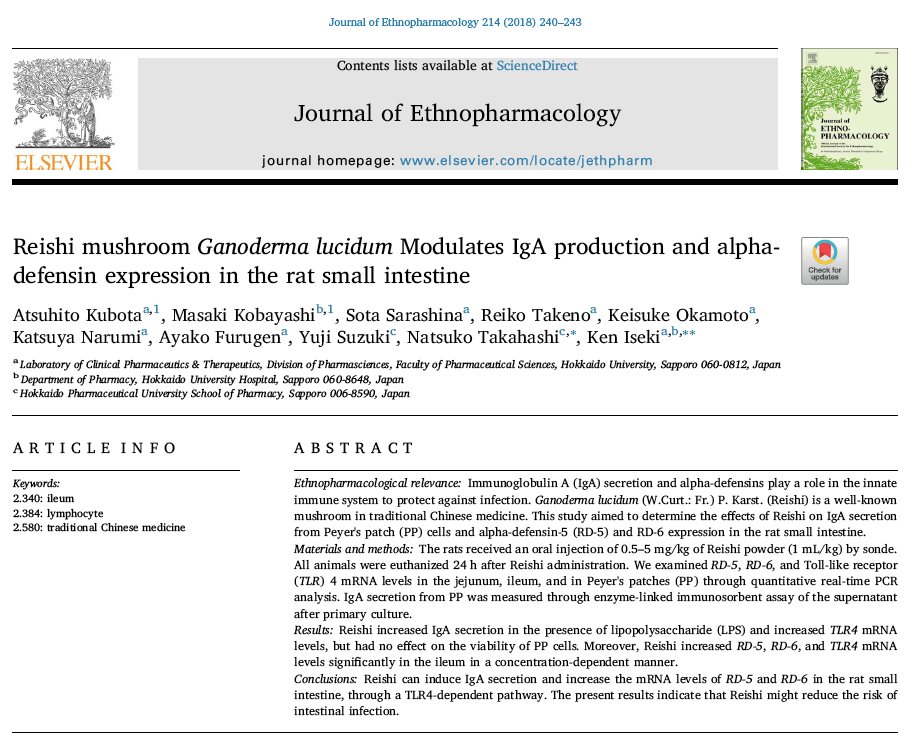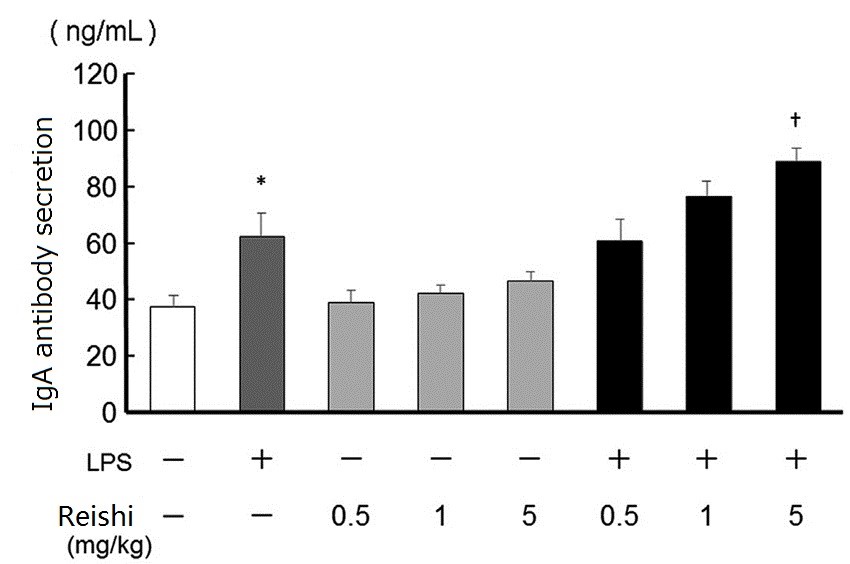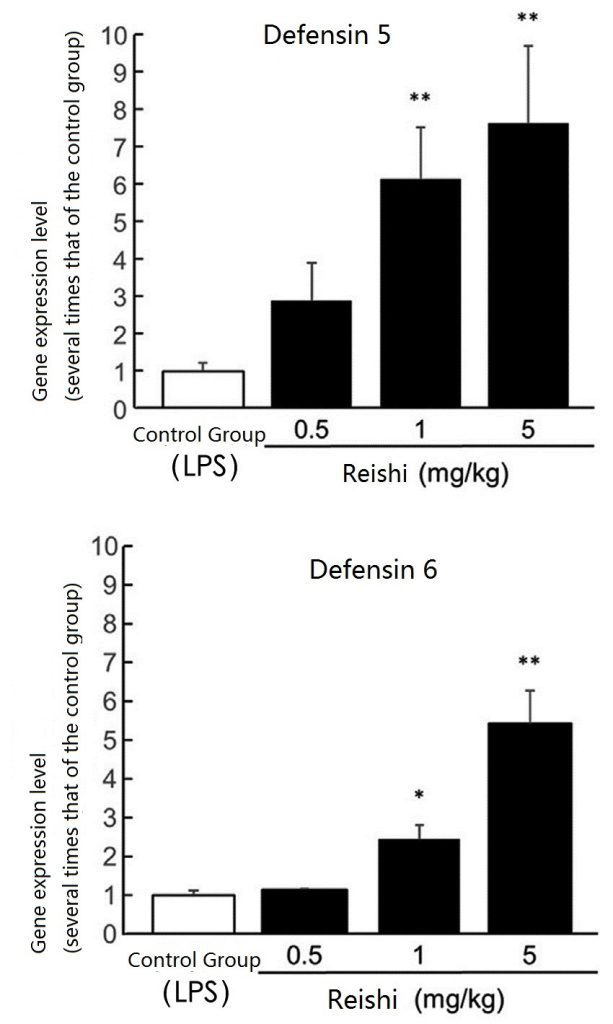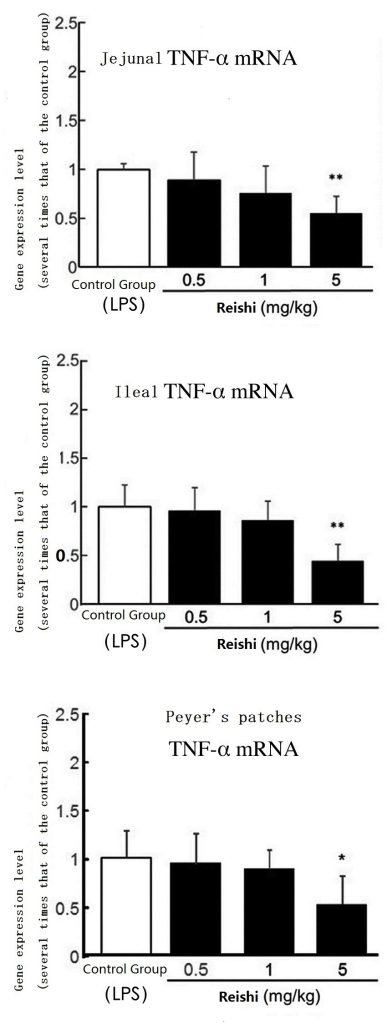Marchar 25, 2018/Hokkaido University & Hokkaido Pharmaceutical University/Journal of Ethnopharmacology
Text/ Hong Yurou, Wu Tingyao

IgA antibody and defensin are the first line of immune defense against external microbial infections in the intestines. According to a study published by Hokkaido University and Hokkaido Pharmaceutical University in the Journal of Ethnopharmacology in December 2017,Ganoderma lucidum can promote the secretion of IgA antibodies and increase defensins without causing inflammation. It is obviously a good helper for improving intestinal immunity and reducing intestinal infections.

When pathogenic bacteria invade, Ganoderma lucidum will increase the secretion of IgA antibodies.
The small intestine is not only the digestive organ but also the immune organ. In addition to digesting and absorbing nutrients in food, também defende contra vários microorganismos patogênicos que vêm da boca.
Portanto, além das inúmeras vilosidades (absorvendo nutrientes) no revestimento interno da parede intestinal, há também tecido linfático chamado “placas de Peyer (PP)”no intestino delgado, que servem como goleiros imunes. Uma vez que bactérias patogênicas são descobertas por macrófagos ou células dendríticas nas placas de Peyer, não demorará muito para que as células B secretem anticorpos IgA para capturar bactérias patogênicas e construir o primeiro firewall para o trato intestinal.
Estudos confirmaram que quanto maior a secreção de anticorpos IgA, mais difícil é para as bactérias patogênicas se reproduzirem, mais fraca é a mobilidade das bactérias patogênicas, mais difícil é para as bactérias patogênicas passarem pelo intestino e entrarem na corrente sanguínea. A importância dos anticorpos IgA pode ser vista a partir deste.
Para entender o efeitoGanoderma lucidum em anticorpos IgA secretados pelas placas de Peyer na parede do intestino delgado, Pesquisadores da Universidade de Hokkaido, no Japão, retiraram as placas de Peyer da parede do intestino delgado de ratos e, em seguida, separaram as células das placas e as cultivaram com o lipopolissacarídeo (LPS) de Escherichia coli para 72 horas. Descobriu-se que se uma quantidade considerável deGanoderma lucidum foi dado neste período, a secreção de anticorpos IgA seria muito maior do que sem Ganoderma lucidum – mas doses baixasGanoderma lucidum não teve esse efeito.
No entanto, nas mesmas condições de tempo, if only the Peyer’s patches cells are cultured withGanoderma lucidum without the stimulation of LPS, the secretion of IgA antibodies will not be particularly increased (as shown in the figure below). Obviamente, when the intestine is facing the threat of external infection, Ganoderma lucidum can increase the defense level of the intestine by promoting the secretion of IgA, and this effect is proportional to the dose ofGanoderma lucidum.

The effect ofGanoderma lucidum on the secretion of antibodies by lymph nodes of the small intestine (Peyer’s patches)
[Observação] The “-” at the bottom of the chart means “not included”, and “+” means “included”. LPS comes from Escherichia coli, and the concentration used in the experiment is 100μg/mL; Ganoderma lucidum used in the experiment is a suspension made of ground dry Reishi mushroom fruiting body powder and physiological saline, and the experimental doses are 0.5, 1, e 5 mg/kg, respectively. (Source/J Ethnopharmacol. 2017 Dec 14;214:240-243.)
Ganoderma lucidum usually also improves expression levels of defensins
Another important role in the forefront of intestinal immunity is the “defensin”, which is a protein molecule secreted by the Paneth cells in the small intestine epithelium. Merely a small amount of defensin can inhibit or kill bacteria, fungi and certain types of viruses.
Paneth cells are mainly concentrated in the ileum (the second half of the small intestine). According to the animal experiment of the study, in the absence of LPS stimulation, rats were administered intragastricallyGanoderma lucidum (at the dose of 0.5, 1, 5 mg per kg body weight) para 24 horas, the gene expression levels of defensin-5 and defensin-6 in the ileum will increase with the increase of theGanoderma lucidum dose, and are higher than the expression levels when stimulated by LPS (as shown in the figure below).
Obviamente, even in peaceful times when there is no threat of pathogenic bacteria, Ganoderma lucidum will keep the defensins in the intestines in a state of combat readiness to respond to emergencies at any time.

The gene expression levels of defensins measured in the rat ileum (the final and longest segment of the small intestine)
Ganoderma lucidum does not cause excessive inflammation
In order to clarify the mechanism by whichGanoderma lucidum activates immunity, the researchers focused on the performance of TLR4. TLR4 is a receptor on immune cells that can identify foreign invaders (such as LPS), activate the message-transmitting molecules in immune cells, and make immune cells respond.
The experiment found that whetherGanoderma lucidum promotes the secretion of IgA antibodies or increases the gene expression levels of defensins is closely related to the activation of TLR4 receptors – TLR4 receptors are the key forGanoderma lucidum to enhance intestinal immunity.
Although activating TLR4 can improve immunity, over-activation of TLR4 will cause immune cells to continuously secrete TNF-α (tumor necrosis factor), causing excessive inflammation and posing a health threat. Portanto, the researchers also tested TNF-α levels in the small intestine of rats.
It was found that TNF-α expression and secretion levels in the anterior and posterior segments of the small intestine (jejunum and ileum) and in the Peyer’s patches on the intestinal wall of rats were not particularly increased whenGanoderma lucidum foi administrado (as shown in the figure below), e altas doses deGanoderma lucidum poderia até inibir o TNF-α.
OGanoderma lucidum materiais utilizados nas experiências acima são todos preparados por moagem secaGanoderma lucidum corpos de frutificação em pó fino e adição de soro fisiológico. Os pesquisadores disseram que porque oGanoderma lucidum usado no experimento contém ácido ganodérico A, e estudos anteriores mostraram que o ácido ganodérico A pode inibir a inflamação, eles especulam que no processo de aumento da imunidade intestinal porGanoderma lucidum Polissacarídeos, o ácido ganodérico A pode muito bem ter desempenhado um papel de equilíbrio no momento certo.

Expressão do gene TNF-α medida em várias partes do intestino delgado de ratos
[Fonte] Kubota a, e outros. Cogumelo Reishi Ganoderma lucidum modula a produção de IgA e a expressão de alfa-defensina no intestino delgado de ratos. J Etnofarmacol. 2018 março 25;214:240-243.
FIM
Sobre o autor/ ms. Wu Tingyao
Wu Tingyao tem relatado informações em primeira mão sobre Ganoderma desde 1999. Ela é autora deCura com Ganoderma (Publicado na editora médica do povo em abril 2017).
★ Este artigo é publicado sob autorização exclusiva do autor.
★ As obras acima não podem ser reproduzidas, extraídos ou usados de outras formas sem a autorização do autor.
★ Por violações da declaração acima, o autor exercerá responsabilidades legais relevantes.
★ O texto original deste artigo foi escrito em chinês por Wu Tingyao e traduzido para o inglês por Alfred Liu. Se houver alguma discrepância entre a tradução (Inglês) e o original (chinês), o chinês original prevalecerá. Se os leitores tiverem alguma dúvida, entre em contato com o autor original, EM. Wu Tingyao.



